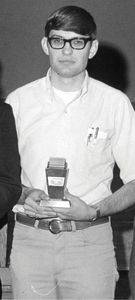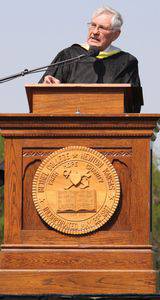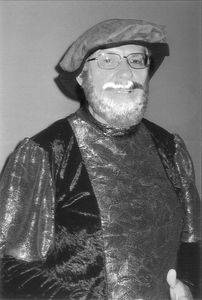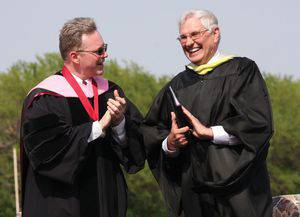The college's essence is personified in one who has been at various times over the last half-century a student, staff person, administrator, cabinet member and pastor: Dale Schrag.
 Dale Schrag talks with Audra Miller and Leland Brown III after Baccalaureate, May 18. Photo by Vada Snider.
Dale Schrag talks with Audra Miller and Leland Brown III after Baccalaureate, May 18. Photo by Vada Snider.If you were to take [Bethel’s] values and mission statement and bottle [them], you would have Dale Schrag.
—freshman Jaykwon Hosey
It’s hard to think of the Bethel College I’ve known for 50 years without Dale Schrag right in the middle.
—Doug Penner ’69, Topeka
When they build the Mount Rushmore of Bethel College, Dale Schrag will be on it.
—Perry D. White, president
I found out Dale was pretty smart when I got to know him as a freshman at Bethel in 1965. There’s one anecdote that illustrates this. One of his profs wrote a comment on Dale’s essay test answer that he should
—Dave Janzen ’69, Goshen, Indianalearn the fine art of condensing your answers to the most important information.
Dale apparently had a fault most of his friends didn’t have to worry about—knowing too much.
 Dale Schrag in 1969 receiving his Thresher Award in history. Photo provided by the Mennonite Library & Archives.
Dale Schrag in 1969 receiving his Thresher Award in history. Photo provided by the Mennonite Library & Archives.Dale and I both entered Bethel as freshmen [in 1965]. We both lived in Goering Hall and had some of the same courses. From those early college years, I have some clear images of Dale: avid supporter of Thresher sports; Dale in Danny Dale & Janet (think Peter Paul & Mary), singing folk songs on the tennis courts; on test days, Dale dressed in suit and tie—in those days, a black suit, white shirt and narrow tie—to convey to himself the seriousness of what he was undertaking.
I learned to know Dale best as a mod-mate when, in our junior year, we initiated the brand-new Warkentin Court. We lived together as a group of nine in two mods, first on the south side and then on the east side in Mod 9C. Learning to know him better simply fortified his image as a very serious student, but one with a wide range of interests, including academics, athletics, music and campus and national politics. —Doug Penner
Even as unsure and hormonal and whacked-out as a bunch of newly-released-from-home ’60s teenagers could be [in 1966], we somehow knew even then that Dale was driven by a passion. Yes, the little-p passion that drove us all when we were in college, but more importantly the big-P Passion that few of us fully realized or knew, that pushes us to use all that we are and could be to do what we do, to be who we are, to become what we might be. That is what—even then—is one of my enduring memories of Dale. And perhaps it isn’t even right to call it a memory because that passion that was so evident then has also been lived out every day of his life since then.
—Deb Schmidt ’70, with Don Schmidt ’69, from a presentation to the Bethel board, April 5, 2014
After our sophomore year, all the cool guys decided to move to Warkentin Court. It was brand-new and we were the first to live there. They came and asked me if I would want to live with them. I remember being surprised and gratified that they let me in. The first year we were in Mod 3—then they just had consecutive numbers, today it would be 1C. The second year it was 9C. [The
—Dale Schrag4 Ds,
a group that remains friends to this day, originated from the mod experience: Dale Schrag, Dave Janzen, Don Schmidt and Doug Penner.] In the second year, there were actually five Ds, including Delbert Gaede ’70. Others were Richard Friesen ’69, Paul Schrag ’69, Laurel Preheim ’69, Mark Stucky ’69 and Stuart Friesen ’69. Some of the memories include: playing Hearts; Laurel Preheim studying all the time, so much he literally wore out the carpet under his desk; everyone being sick with diarrhea and vomiting.
Dale may well be the only person ever to dress up in a coat and tie to take tests while a student at Bethel. … That kind of extra effort is a hallmark of Dale. … It has been suggested that the only lecture Dale ever missed in college was the one on
—Deb Schmidtnon-anxious presence.
My subsequent images of Dale are gathered from the years beginning later in the ’80s when he returned to Bethel as director of libraries and I was on the faculty. From those years to the present, his roles at Bethel have conveyed a consistent theme that centers on all four of Bethel’s core values: discipleship, scholarship, service and, most clearly, integrity.
—Doug Penner
I came back to Bethel in 1984. I think I wanted to come back from the day I left, so much so that in 1982, I think, Harold [Schultz, then president] tried to recruit me for director of admissions. I was so enthralled with the chance of getting back to Bethel I said I would do it. Margo resisted mightily, my house church [at Lorraine Avenue Mennonite Church, Wichita] resisted mightily, and I couldn’t hear anybody. I was sure I should go back. Margo wouldn’t bend and ultimately I couldn’t sign the contract. Jim Harder ’78, working for News Service, had even taken my picture, so I appeared in the alumni bulletin as director of admissions. Two years later, Harold came back and asked me to be director of libraries. Margo said,
—Dale SchragI’m not wild about moving to Newton, but that I can handle.
I think she saved my life. I think I’d be dead now if I’d taken that position. [Working at Bethel for 30 years] has been a liberal arts experience. Twoand- a-half years later [in 1987], I was preaching a centennial sermon in front of 2,500 people. I had the opportunity to talk to classes, to go out to local churches, a constant progression of new things. I was granted a sabbatical— the last administrative sabbatical in the history of Bethel College, to Germany for research on Erasmus. In 1992, John Zehr came and said, We have other things for you to do besides director of libraries,
and created the position of director of marketing and church relations. It was something new and I got a whole lot more exposure in churches. In 1996, [Dean] Marion Deckert ’56 asked if I’d be the executive for the Higher Education Council [of the General Conference Mennonite Church], one-third time. I got to know people across the broader church—invaluable for church relations and planning choir tours. [When that position ended] in 2002, John Sheriff was academic dean, and he asked me to teach one section of BIFL and be convo coordinator and I foolishly said, Sure.
It was a lot of stress, but precious experience. All the way along, I derived enormous satisfaction from preaching in area churches and going on choir tours. I never really had a bad experience. That’s why it’s been such a good job. I always used to say I have the best job in the world and I wouldn’t trade it for anything.
 Dale Schrag’s address at the 2014 commencement ceremony was titled
Dale Schrag’s address at the 2014 commencement ceremony was titled Always be a Thresher.Photo by Vada Snider.
He’s been an interpreter of Anabaptist Mennonite history and thought to the campus community and beyond and used that role to remind contemporary Mennonites of the connections between intellect and spirit: intellectual rigor and thoughtful, critical thinking are an essential part of faith, of what it means to be a Christian, a Mennonite Christian. In lecturing about Mennonite history or role playing Mennonite historical figures like Felix Manz and Pilgram Marpeck, Dale has always looked for ways to use that history to re-center and reorient contemporary campus and denominational conversations rather than just celebrating historical roots.
—Doug Penner
Dale is passionate about sports—at least Bethel sports. He is passionate about music. He is passionate about his kids and grandkids—oh, did I say Margo? He is passionate about doing things that are right and just. He is passionate about Menno Simons, Michael Sattler, Pilgram Marpeck and Erasmus. He is passionate about Europe—past and present. He is passionate about the church. About Bethel College. About the kids who pass through here, and who they are, and who they will be. He is passionate about faith and God and tapping into the infinite mystery and love found there—personally and for others. He is passionate about doing and being and becoming all he can do and be and become.
Dale has a way of delivering a sermon on Anabaptism as if he were a coach in the final minutes of a Final Four game when his team is down 1 with 10 seconds to go. Sleeves rolled up, pacing up and down, every nerve focused on the task at hand. He almost wills his audience to share his passion and experience it on a personal level. (No one will ever forget his slapping his own cheek during those events with such force as to almost knock himself out.)
—Deb Schmidt
I’ve been … impressed over the years with Dale’s commitment to the liberal arts college in the Christian tradition, and his passion for bringing the
—Dave JanzenAnabaptist Vision
to life and to the attention to Bethel students each year. His message about the value of the Christian liberal arts college [during Bethel’s centennial celebration in 1987] was one of the most thoughtful and passionate calls to support the mission of Bethel College and others like her that I have ever heard.
As his colleagues, students and many alumni already know, Dale carries and works out of a vision for the liberal arts that combines intellectual strength and spiritual depth. That vision becomes a daily goal for his efforts with students and constituency. Dale’s zeal for academic excellence coupled with and grounded by growing, seeking spiritual maturity is not only catching, it is inspiring.
—Deb Schmidt
It’s a good idea for anyone, not just Mennonites, to consider a Mennonite liberal arts education. Look at [Bethel’s] four core values. There is a very obvious Anabaptist emphasis: Jesus as Messiah and model; seeing scholarship as a result of intellectual stewardship;
concern for the powerless
as intrinsic to the Christian gospel; integrity, [meaning] that all of life needs to be integrated.
Those are values that absolutely everyone who claims to be Christian can and should affirm. They make the educational enterprise more holistic and healthier. Everybody has some kind of spiritual side. To go through an educational experience in the most shaping years of your life–there are no years more significant than 18 to 22, it’s when you will own a life philosophy, when you will likely choose a life partner—to do that in some kind of compartmentalized, highly specialized environment is a disaster. I have no illusions that’s an easy sell for a 17- or 18-year-old. John Zehr used to have this great story. He has five kids, all incredibly smart. The four boys went to Goshen [College in Indiana], his daughter to the University of Illinois. She would openly grieve when she heard her brothers talk about their college friends, even though she got a crackerjack education in terms of knowledge. If there were some way of packaging that, it would make all the difference.
—Dale Schrag
For many years, Dale has been the face of Bethel College to congregation after congregation. Calming the waters, reassuring, teaching, bringing together, challenging and holding firm to the understanding that the church is important and crucial to the college, and the college is important and crucial to the church.
[His] qualities are wrapped up in a person who also knows how to listen to others, is able to laugh easily at himself, is willing to speak out when necessary and has a deep sense of being true to what is just. We might say Dale is confidently insecure, or maybe that he wears humility
well. —Deb Schmidt
In August 2008, I stepped in less as campus pastor than as chapel planner. I always saw it as an interim and still do—it was just a six-year interim. I have played some kind of role in spiritual life at Bethel ever since Patty Shelly ‘76 came, so for 25 years. When she came, she served as campus pastor/chapel planner. She put together a chapel planning committee and I was on it every year. There was a time when Patty got a mini-sabbatical to finish her dissertation, and I took over chapel planning. I think that’s when I came up with the Messiah sing [at the end of fall semester]. That’s one of my babies, along with Christmas Gala—doing away with Christmas Fest because it was unfair to students; we should rather do a celebration for our students.
 John Sheriff, left, shakes hands with Dale Schrag at a reception for Bethel retirees. Photo by Vada Snider.
John Sheriff, left, shakes hands with Dale Schrag at a reception for Bethel retirees. Photo by Vada Snider.I wasn’t here in the ’70s but I’ve talked to people who were. There was a prominent theologically conservative student population but it almost defined itself in opposition to the predominant liberal norm. I think over the years theologically conservative students have become much more integrated into the mainstream of the campus. That’s partly a function of shifts in faculty—we have more openly theologically conservative faculty than we did 30 years ago, so the students don’t feel as isolated. We might have had them 30 years ago but they wouldn’t have admitted it because the liberal contingent was so outspoken.
I would see that as a shift. I still marvel that I’ve got six student chaplains, only one is Mennonite, and it doesn’t bother me a bit. Twenty-five years ago, to have a Marvin Rice—a Pentecostal, with absolute conviction in and complete commitment to biblical inerrancy—just wouldn’t have happened, [but] I find myself totally comfortable with it.
Is that where I am? Absolutely not. Is that where a lot of students are? Absolutely. You meet students where they are. There are enough influences pointing out alternative views that should not be instantly affirmed or denied, but distinguished. I think it’s also true that spiritual life ebbs and flows.
—Dale Schrag
An ongoing passion or commitment of Dale’s has been to acknowledge and nurture, to uncover and tend to, the leadership qualities students possess. To give encouragement, opportunities and guidance for students’ abilities and faith to take root and deepen, regardless of the bent or stripe of that faith. He wants all students to experience God in a context that is authentic for them.
—Deb Schmidt
[One] purpose of a college education is to get a job, and our professors do a great job of helping us with that. Dale cultivated spirituality and a spirit of generosity no job can afford and no money can buy.
—Kevin Coash ’14
It is Dale’s enduring friendship over the years that I value the most. … I don’t think any of us could anticipate the challenges we would face as we left Bethel in 1969, nor how important the friendship of our peers would be to help us keep the faith as we journeyed on.
—Dave Janzen
Most of my highlight memories involve chapel, convo or Concert Choir, including my own experience in Concert Choir, going to Europe in 1967 for Mennonite World Conference, singing Bach’s
Motet No. 6
with an East German choir in East Berlin. Or being with the choir in Europe in 1990 when Roz Royster ’93 and Arthur Marks ’93 were in it, watching Roz teaching the choir this gospel song, Jesus Christ is the way.
The Concert Choir singing When David heard
in chapel [the spring after senior Seth Dunn died in August 2011], and also at West Union Mennonite Church [in Kalona, Iowa] on choir tour after the pastor and his wife at Kalona Mennonite Church had been killed in a car accident.
As far as convocation: I’m surprised that
—Dale SchragAquinas got legs
[see Schrag-isms,
below], especially since we have no proof he ever said it. When I introduced it the first time, I never expected that. Not only is it the theme for baccalaureate in 2014, but Patty says in her upper-level religion classes, she asks people to list five principals they use as they’re considering questions or issues and that often turns up. Why do my most positive memories have to do with these three things—choir tour, chapel, convo? I think it reinforces that the powerful experiences are all about relationships.
If you think about some of the pieces of wisdom he’s shared with students and, just as important, with faculty and staff, over the years, they have in common an embrace of connectedness across boundaries. Dale’s campus role has always included helping students from varied backgrounds understand and appreciate each other—Mennonites and other cultural backgrounds, conservatives and liberals, white students and ethnic minority students, etc.
I doubt that anyone who’s been a part of Bethel’s last half century has worked harder to foster mutual respect and inclusion on the campus than Dale. Students from all backgrounds have loved Dale because he’s loved them and conveyed that in chapel, in classes, on choir tours. His care and concern for students is genuine and emotional, revealed by an occasional loss of composure when speaking from the heart. It is honest. It has integrity, in the everyday use of that term.
—Doug Penner
 Dale Schrag gives Rachel Evans ‘14 a hug after his last chapel service at Bethel. Photo by Vada Snider.
Dale Schrag gives Rachel Evans ‘14 a hug after his last chapel service at Bethel. Photo by Vada Snider.Dale has always been a presence, a force, in the lives of students. Whether in the classroom, convo, Mojo’s, the sidewalk, the cafeteria, the field, the court, the choir tour—Dale is there 100 percent and often more. And whether you are a student, a colleague, a constituent, Dale is Dale. What you see is what you get. And you get a lot of it. Meaning—he is authentic and available.
—Deb Schmidt
He’s the only one who can get anyone to do anything.
—junior Liz Schrag
Everyone deep down loves being
—Daniel Barrera ’14Schrag-ed.
All humans have a desire to feel loved and cared for, and that’s what Dale does.
—senior Lina Adame
Dale has made one of the most complete and versatile contributions to Bethel College in her long history.
—Dave Janzen
Almost all of us know the experience of leaving a job, a career, an institution and watching it flourish from a distance, without us. But most of us also know that sometimes there are people who give so much of who they truly are in so many ways that when they move on, it almost feels— at least for a while—as though there is not enough air, enough joy, enough of some of those unnamable qualities some people possess to fill the space that is left. … Because we love Bethel, we will not forget to be incredibly grateful to the special men and women, like Dale, who give so much to make this a place that teaches how to learn, how to live, how to love and how to give back.
—Deb Schmidt
Excerpt from How Great a Cloud of Witnesses… (Part I),
sermon given by Dale Schrag during the Bethel College centennial celebration, Oct. 11, 1987:
[Erasmus’] fundamental argument was that all truth is God’s truth. He was unqualifiedly convinced that God and truth had been revealed in the life, death and resurrection of Jesus Christ, and that all truth, all knowledge was, therefore, a reflection of Christ … And this was, I believe, the basis for Erasmus’ uncompromising commitment to scholarship and to excellence. If all knowledge is truly a reflection of Christ, then learning—and teaching—become truly sacred tasks, and to do either of them poorly is sacrilegious. If all truth is God’s truth, then we must seek the truth without compromise—not carelessly or sloppily, because God deserves only our best. Erasmus was, you see, convinced that education could affect behavior. He believed that the truly learned would come to know that they must do justly, love mercy and walk humbly with their God. He would argue that it is not the truly educated, but the partly or poorly educated who are grasping, selfish, arrogant and proud. … Who is or is not included among the
apostles and prophets
[from Ephesians 2:19-21] is finally of much less importance than the fact that Christ is the cornerstone. And because he is the cornerstone, even Socrates may be considered an apostle or prophet
insofar as he reveals and confirms the truth of Christ. …
We have indeed been surrounded by
so great a cloud of witnesses.
Women and men, well-known and largely unknown, both within and without the church, who by their lives and writings have helped us understand who we are and who God is. They have given us insight into truth—God’s truth. But in that cloud of witnesses, in that foundation of apostles and prophets, there stands a cornerstone, the ultimate exemplar, the pioneer and perfecter of our faith, Jesus the Christ, who has been, and is, and ever should be, the cornerstone of the Christian liberal arts at Bethel College.


